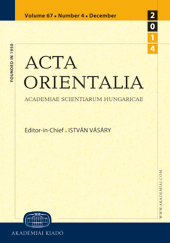Tracking a devil in a textual maze - Citations from the Mudrārākṣasa in anthologies of Sanskrit poetry
Tracking a devil in a textual maze - Citations from the Mudrārākṣasa in anthologies of Sanskrit poetry
Author(s): Dániel BaloghSubject(s): Poetry, Theoretical Linguistics, Other Language Literature, Theory of Literature
Published by: Akadémiai Kiadó
Keywords: Mudrārākṣasa; Viśākhadatta; subhāṣita; Sanskrit poetry; Sanskrit drama; proverbs; citation; intertextuality;
Summary/Abstract: Viśākhadatta’s Mudrārākṣasa is somewhat unique among Sanskrit dramas in that its plot is concerned with political intrigue. Though the occurrence of certain stanzas of the Mudrārākṣasa in other (non-fiction) works has been noted even by early editors of the play, no attempt has yet been made to fully explore the textual interconnections of the play. The present paper attempts to sketch a map of the appearance of Mudrārākṣasa stanzas in anthologies of Sanskrit poetry. Such anthologies containing hundreds of well-phrased (subhāṣita) stanzas – collected from classical literature, but detached from their context and usually arranged in thematic chapters – made their appearance on the literary stage at the end of the 11th century and remain popular to the present day. Out of the total 175 stanzas of poetry in the Mudrārākṣasa, 18 occur in one or more major subhāṣita anthologies and other literary works. While 12 of these are probably indeed Viśākhadatta’s own compositions according to the testimony of the anthologies, the authorship of the remaining 6 is somewhat dubious, since they are attributed in one or more anthologies to a different source, and/or are found in texts that may be earlier than the Mudrārākṣasa. The paper argues that stanzas of poetry, mostly of a gnomic/didactic nature, could freely migrate not only from works of fiction into anthologies but also in the opposite direction. Widespread quotes that sounded relevant to a specific situation may well have been inserted into the text of dramas (and other opuses) both by the playwrights themselves and by subsequent copyists or redactors of their texts.
Journal: Acta Orientalia Academiae Scientiarum Hungaricae
- Issue Year: 66/2013
- Issue No: 3
- Page Range: 247-265
- Page Count: 19
- Language: English
- Content File-PDF

